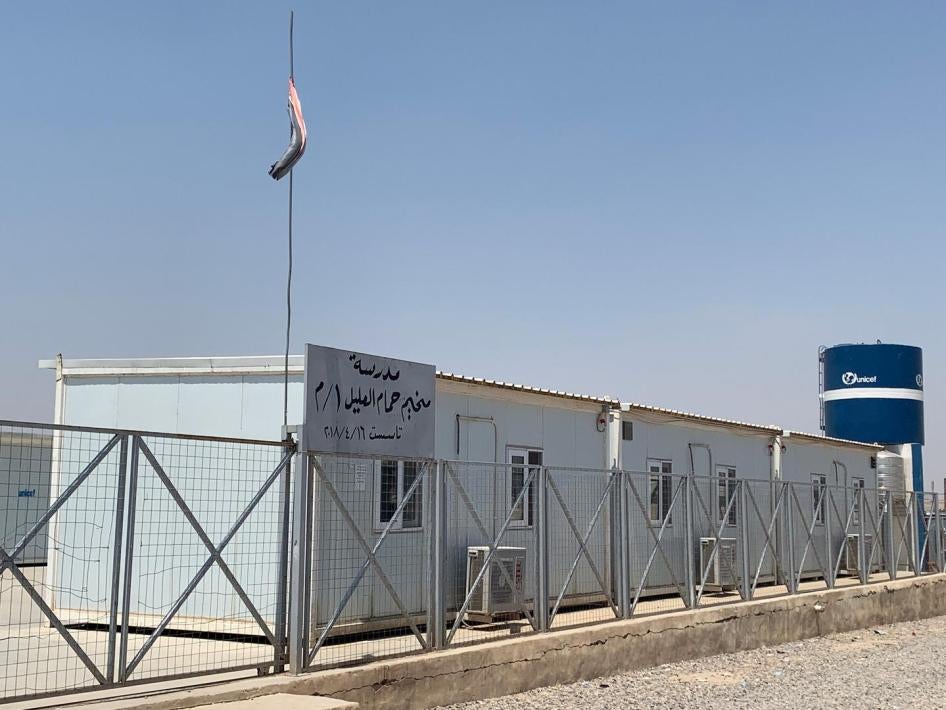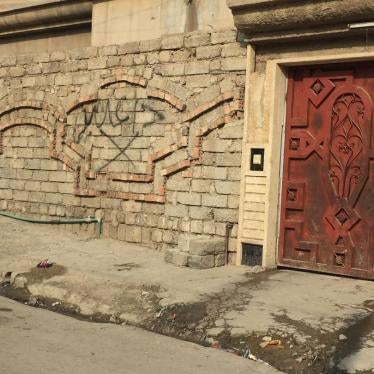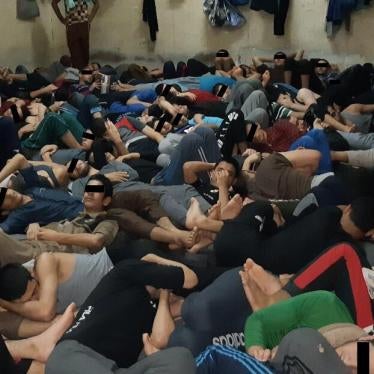(Erbil) – Iraqi military have accompanied police in entering a camp for displaced people south of Mosul and started “screening” over 3,500 households there, Human Rights Watch said today. The screenings appear to include questioning camp residents about the actions and whereabouts of their relatives who are suspected of Islamic State (also known as ISIS) affiliation.
The arrival of the armed men, who occupied a school in the camp, is causing panic among camp residents, who have told Human Rights Watch that they fear arrest over the acts of their relatives, and in some cases sexual exploitation. Iraqi authorities have said they plan to conduct similar screenings at other camps for displaced people in the governorate.
“While Iraqi police forces should be taking reasonable actions to improve security for everyone, the military should not be occupying schools or even entering camps for the displaced,” said Lama Fakih, acting Middle East director at Human Rights Watch. “No one should become a criminal suspect just because of their relatives.”
Nine residents of Hammam al-Alil 1 camp, 30 kilometers south of Mosul, told Human Rights Watch that on July 6, agents arrived from Military Intelligence, the National Security Service (NSS), the Popular Mobilization Forces (PMF), the Special Weapons and Tactics (SWAT) forces under the Ministry of Interior, and local police.
The camp houses over 3,500 families who have been displaced for years, since fighting between ISIS and Iraqi forces broke out in the area. The families in the camp were screened when they arrived.
After some discussion, the residents said the security agents decided to conduct the screenings from the school inside the camp, which is closed for summer recess. Given the involvement of military forces, this violates international humanitarian principles and is contrary to the Safe Schools Declaration, a commitment Iraq endorsed to protect education in conflict by refraining from the use of schools by military forces. Human Rights Watch has found that the presence of fighting forces in schools endangers students and teachers, can lead to the damage and destruction of education infrastructure, and can interfere with students’ right to education.
Two witnesses told Human Rights Watch that there is already a screening site next to the camp. Aid workers at the camp said they protested the use of the school, but that security forces ignored their concerns and began using the school to screen residents on July 9, calling on families to start coming in in groups of 25.
After the first day of screening, security forces halted the process because of the objections from the aid groups, three aid workers said. As of July 17, Human Rights Watch was informed that authorities in Baghdad had decided that the screenings would relocate to the nearby screening site in coming days.
Three witnesses also said the security forces were carrying arms when they arrived and during the screening, including at the doorway into the school caravan. An army colonel who manages security at the screening site adjacent to the camp told Human Rights Watch that they needed to be armed because his forces do not have a presence inside the camp, and because of fears that camp residents are potentially armed, smuggle drugs and alcohol into the camp, and are engaged in criminal activity like prostitution.
Former Prime Minister Haider al-Abadi issued a decree in 2017 reiterating orders that security forces are not allowed to enter camps with weapons.
Three aid workers said the authorities told camp management they intended to conduct screenings to gather the details about the families inside the camp including their governorate of origin and to identify which families were ISIS-affiliated. The aid workers said the managers implied that families might be hiding ISIS relatives, saying they had been informed that some women in the camp with supposedly missing husbands had become pregnant in recent months, and they said they wanted to issue civil documentation to those without it.
The witnesses said they saw security forces give a group of informal community leaders in the camp forms and told the leaders that they had to give one form to each family and would risk legal action if they missed anyone. Human Rights Watch has obtained copies.
The forms tell each family to list all family members, with names, birthdates, gender, and marital status, the family’s home address, type of vehicle, and date of displacement. The forms tell families to list every family member who joined ISIS and to provide details on when they died, disappeared, or were arrested. The forms provided do not say why this information is being gathered, or by which authority.
The military colonel who manages security at the screening site outside the camp also told Human Rights Watch on July 11 that the authorities wanted to ensure that all families in the camp missing civil documentation could obtain it. However, two families who underwent the screenings on July 9 said that they told security forces they had children without civil documentation and the security forces did nothing to register the children or facilitate their access to documentation.
One woman said that she told security forces that her husband, who had joined ISIS, died in September 2017. She said: “They asked me if I was sure he was dead, and I said yes. Then they threatened – we will check that and if it turns out that you lied, we will take legal action against you.”
Another resident said: “The screenings triggered a panic in the camp, with families fearing arrest just because they have a relative who joined ISIS.” He said he knew of families who fled the camp upon hearing about the screenings, even though their home had been destroyed during military operations and they had nowhere to go.
Human Rights Watch has documented dozens of arbitrary arrests and enforced disappearances in the context of screenings linked to counterterrorism operations over the last three years in Iraq, including of family members of people perceived to have been affiliated with ISIS.
“Women near my tent were saying to me they were scared of what might happen to them going into that school alone to be screened by a group of male security forces,” the second resident said.
Four camp residents said they personally knew of cases of security forces engaging in sexual exploitation in the camp in the past. Two women described security forces entering the camp and coercing women they knew into sex, including for pay, particularly women who no longer had male adult relatives with them. One camp resident said she knew of two women in the camp who had become pregnant within the last six months as a result of coerced sex by security forces in incidents not linked to the screenings.
Two senior aid workers said the authorities have said they are planning to conduct these screenings at all camps for displaced people in Nineveh. They said they fear the security forces will again violate principles around the civilian nature of the camp by entering the camp armed and by taking over and using civilian infrastructure.
Iraqi forces should carry out Iraq’s commitments under the Safe Schools Declaration and refrain from using schools for military purposes. No military forces should enter displacement camps with their arms.
Individuals should only be detained according to the law, when there is evidence of their having committed criminal offenses themselves, and not because of the actions of their relatives.
“Security forces should ensure that they conduct their operations in line with Iraqi and international principles, and in a way that is humane and dignified for the families who participate in it,” Fakih said.









